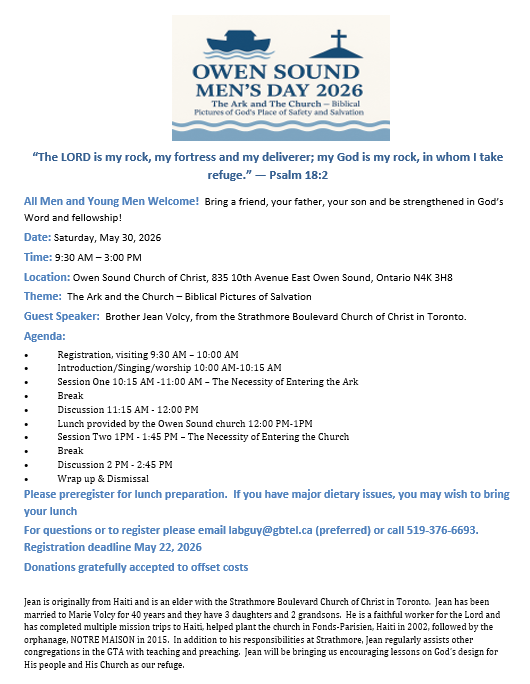Text: 2 Cor 8-9
Money is a delicate subject in the life of the church. Often associated with worldliness and greed (1 Tim. 6:10), these negative connotations are hard to overcome. So, the Apostle Paul follows his discussion of giving, by explaining that his goal was to “…take every thought captive to the obedience of Christ” (2 Cor 10:5). And while it is unlikely that attitudes towards money were at the top of the list, the context suggests that they were certainly on it.
He wrote:







Now I, Paul, myself urge you by the meekness and gentleness of Christ—I who am meek when face to face with you, but bold toward you when absent! I ask that when I am present I need not be bold with the confidence with which I propose to be courageous against some, who regard us as if we walked according to the flesh. For though we walk in the flesh, we do not war according to the flesh, for the weapons of our warfare are not of the flesh, but divinely powerful for the destruction of fortresses. We are destroying speculations and every lofty thing raised up against the knowledge of God, and we are taking every thought captive to the obedience of Christ, and we are ready to punish all disobedience, whenever your obedience is complete. (2 cor 10:1-5)
At Corinth, some had accused the apostle Paul of ‘peddling the gospel’ (2 Cor:2:17). They claimed that he was just in it for the money and may have implied that the collection for the ‘saints in Jerusalem’ was really for himself.
So Paul took steps to silence his critics and reassure supporters. Money collected would be put into the hands of men chosen by each congregation who would personally deliver it to the leaders in Jerusalem. This combined an unbroken chain of custody with personal accountability to set an enduring standard for inter-congregational support (1 Cor 16:3-4). And if it did not work out for Paul to go with them, he would supply each congregational representatiave with letters of introduction and commendation.
When Paul wrote that “though we walk in the flesh, we do not war according to the flesh”, he indicated that the church must deal with everyday realities. We ‘walk in the flesh’. Matters of wealth and poverty, hunger and homelessness must be dealt with…but not ‘according to the flesh’. Spiritual warfare is needed for Christian stewardship to overcome selfishness and grow into the kind of benevolence that places its trust in God.
Paul saw the poverty of the church in Judea as an opportunity. It was an opportunity for Gentile churches to give something back to those from whom the gospel had proceeded. An opportunity for Christians to ‘grow up into the image of Christ’ who emptied himself to make them rich. It was an opportunity to soften the attitudes of Jewish Christians toward Gentile brethren, thus unifying the church and multiplying the thanksgiving directed toward God who had made all of this possible.
Someone has observed that the faith that we practice is a more true indication of our real faith than the one which we profess. It is a practical faith that includes our pocketbooks, but starts in another place.
Paul began by highlighting the positive example set by the churches in Macedonia in order to highlight the core principles of Christian giving. We will consider these in the order in which they appear in 2nd Corinthians chapters 8 and 9.
God always gives first. 2nd Cor 8:1-5.
When the churches of Macedonia heard of this good work, they responded from a place of joy. They were so thankful for their salvation that nothing that they were asked to do, was too much. The grace of God had made them spiritually rich while living in poverty. So they drew from the place where they were rich, and it caused them to consider what they could do – instead of what they could not. They did not allow financial poverty to stand in their way.
Not only that, but the grace of God changed their hearts so that they begged for the honour of giving. Perhaps most important of all, they first gave themselves. And having given themselves, held nothing back in reserve.
Paul says that this was exactly what God wanted. It was done ‘according to his will’ as a voluntary response to God’s grace. By pointing to a positive example, Paul was encouraging churches to outdo one another in good deeds.
Good intentions alone are not enough. Verses 6-15
The church at Corinth had begun to set aside funds but had not yet finished. The church at Corinth had been the first to respond to the call for relief funds, but were now in danger of falling short. Paul pointed out that it was first to their benefit to finish what they started and to grow as a result of perseverance.
God does not expect us to give – what we do not have (vs 12).
The church at Corinth was wealthy compared with the one in Judea. The purpose of their gift was not to put others ‘on easy street’, but to raise them to a position of equality. And it would do so on the principle that God blesses those who give. Like manna in the days of Moses, those who gathered much, had no more than those who gathered little. God provided for the daily needs of all. Yet in this case, God’s blessings had not fallen equally upon all, calling on some to share what they had.
A faithful servant of God is trustworthy. (8:16-24, 9:1-5)
Paul sent Titus ahead of himself so that when Paul arrived, they would not be caught off guard and unprepared. Paul had been bragging about their generosity and eagerness to help. To avoid embarrassment and perhaps a form of ‘painful giving’, Paul urged them to finish this collection before he arrived.
He reminded them of the process that he intended to use to ensure that everything was open and above-board. He was sending Titus along with another brother – to oversee the handling of funds. Titus was a trusted companion and fellow evangelist, and the other brother had been selected by contributing congregations and was described as the one whose fame in the things of the gospel has spread through all the churches (vs 18). As it was with the seven (deacons) selected to manage the distribution of food to the needy in Acts 6:3, a reputaton for integrity was called for by those handling of church funds.
Sometimes it is not enough for God to know where our hearts are. We need to take steps to ensure that we do not fall into temptation and that no one is given reason to suspect our actions or motives. Accountability is not only for our own protection but also for any future appeals for similar works. So we find in the writings of Paul some ‘best practices’ for congregations regarding the management of money and inter-congregational cooperation.
Chapter 9:6-15 Additional principles:
- The more that we give, the more the Lord increases our capacity to give. What we have has come from God who will continue to give as we pay his blessings forward. God rewards generosity with more of the same.
- God is pleased when we are pleased to give. There is nothing grudging about God’s grace. Christ came to earth voluntarily and went to the cross of his own free will. This is the kind of giving that God wants. He wants to benefit the giver at least as much as the benefit received. The giver learns to trust in God and not in himself. He treats his things as if they belong to God in the same way that he himself does. And when received as an expression of God’s love – God’s blessing of his people through his people – results in church-wide thanksgiving and glory to his name.
- Giving for the purpose of sharing – is proof that our faith is genuine, and further reason for thanking God. Paul envisions prayers of thanksgiving to God from those who needed the gift…and prayers asking God to bless those who have given.
What an incredible formula for unity in the church. Each congregation – thankful for each other and asking God to bless the other. Imagine that. Congregations of the Lord’s church in love with each other, ‘yearning for each other’ and basking in the blessing of a united fellowship. Jews and Gentiles, hand in hand with hearts united.
Only God can do this…and he will, when we follow their example.
Barrie ON.

